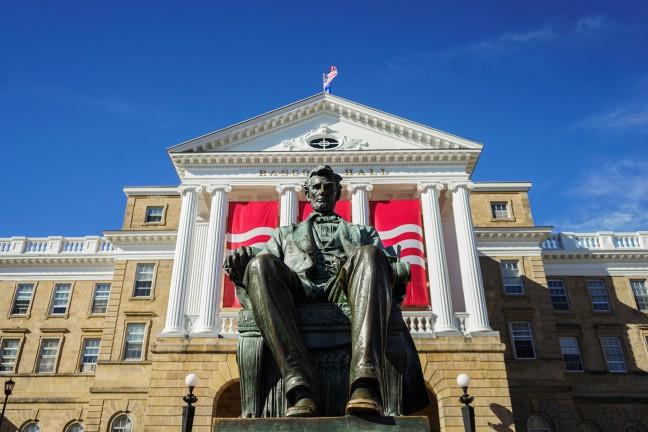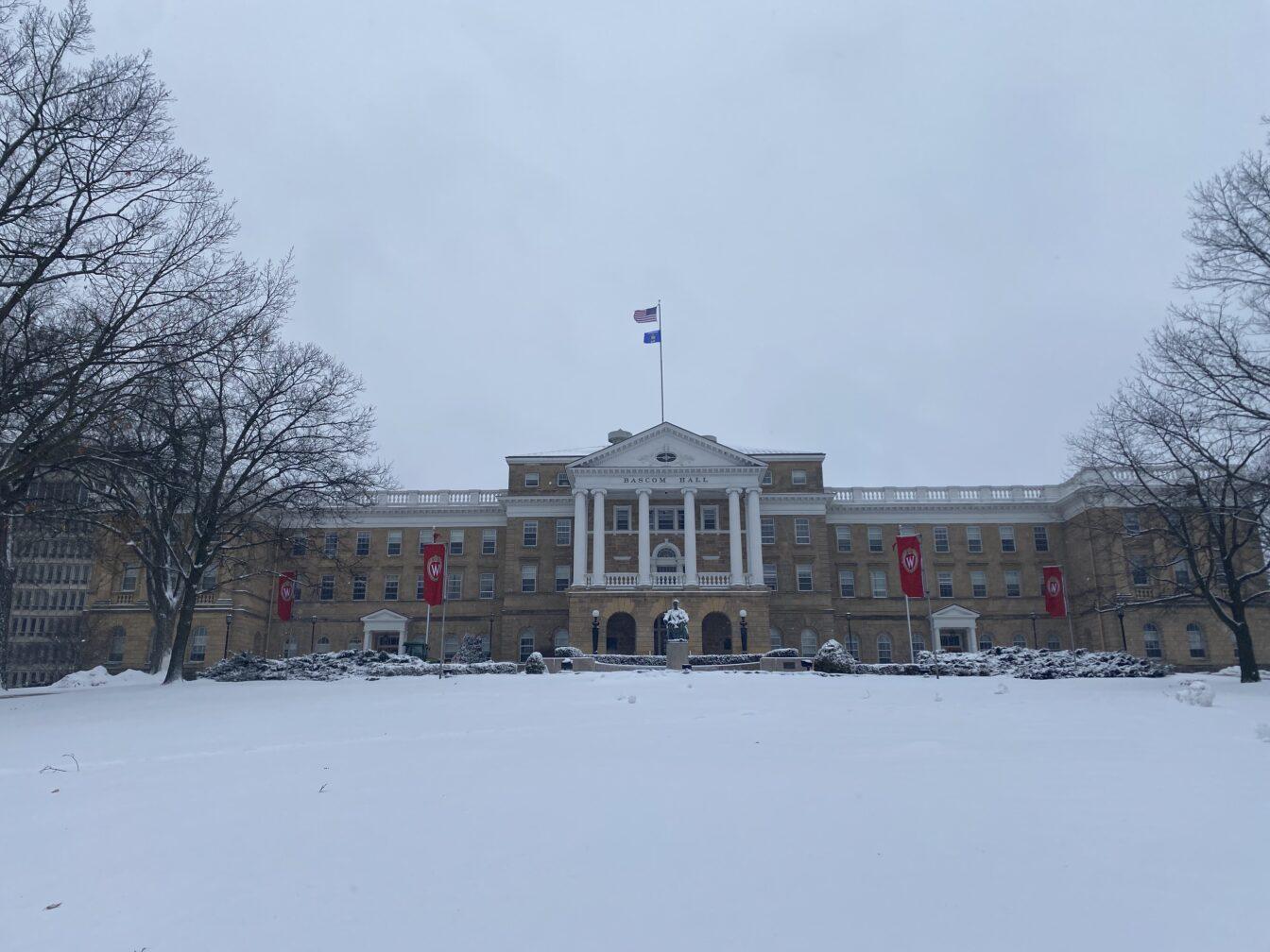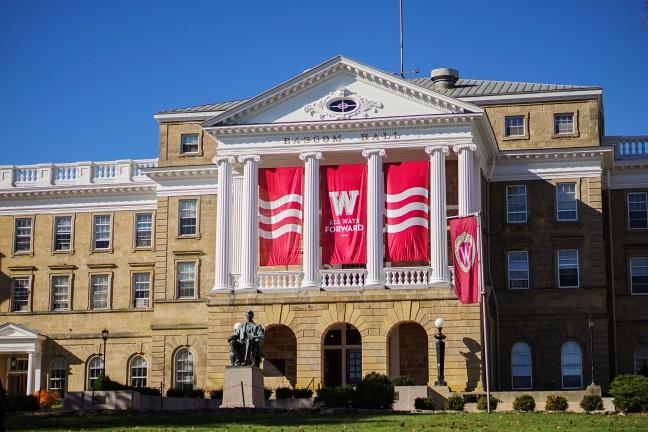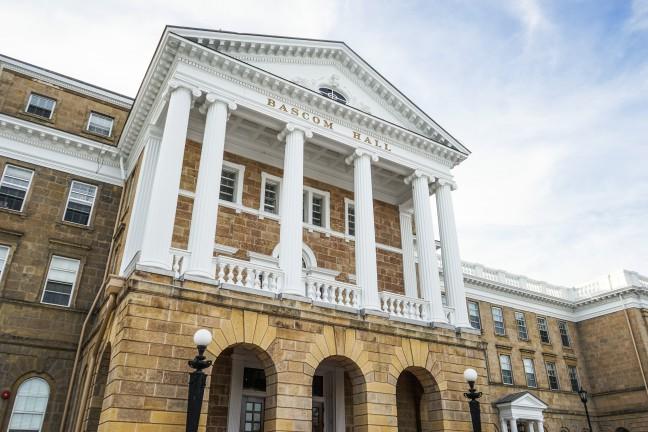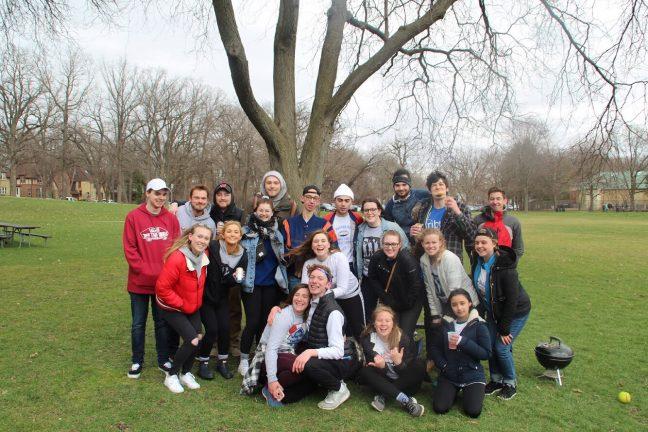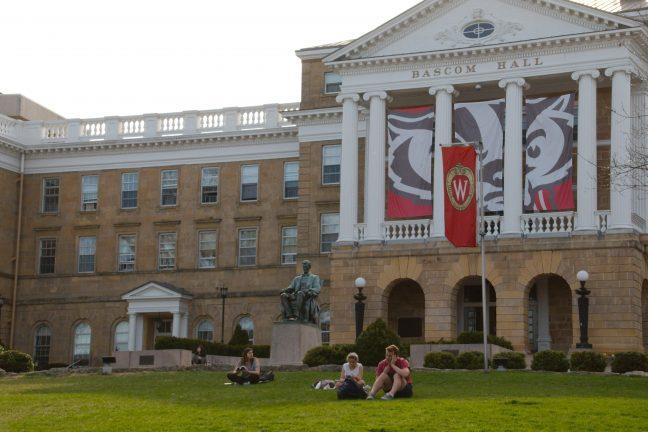This semester was one to remember. With climate strikes, homecoming controversy and Wisconsin Republicans acting more shameless than ever, there was a lot to keep track of. But worry not — The Badger Herald Editorial Board has you covered. Here are the most important, and most contested stories from this semester.
“This is a White” Award: UW’s Homecoming Video

Something is rotten at the University of Wisconsin. And it’s been rotten for years — a persistent problem from the beginning.
We are, of course, referring to diversity and the campus climate, which has long been described as unwelcoming at best and hostile at worst for students of color. This semester’s homecoming video showed how this perennial problem can rear its ugly head in new and seemingly endless ways.
The video, produced by the student-run homecoming committee, was excessively white. Excluded from it were historically and currently marginalized student populations — people who are expected to call this place home. Which they don’t. How could they?
Cue #HomeIsWhereWIArent, a campaign that emerged from this fiasco and called attention to the experiences of UW’s students of color. An alternative homecoming video came with it, communicating that, for some, this university is anything but home.
Certainly, problems abound in this situation. For starters, a quick look at UW’s homecoming video will show that there simply aren’t enough people of color at our decision-making tables. Or, what’s more, in our classrooms. In our dorms. At our dining halls. You get it.
But to say this problem is specific to UW would be a grossly narrow reading of it. Higher education more broadly has been failing the diversity test since day one. Which then prompts a question: What can be done about it?
At UW, certain programs with the ostensible goal of fostering diversity have been implemented. Bucky’s Tuition Promise, which covers tuition for any in-state families with an annual income of less than $56,000, has identified greater socioeconomic and racial diversity on campus as one of its desired outcomes, as have diversity-based scholarship programs, along with the implementation of new campus cultural centers.
But is that enough? Does it change anything? Diversity for diversity’s sake doesn’t mean much if an accepting space has not been created in tandem. Governments and administrations have long grappled with the question of whether they can legislate hearts and minds. Certainly they can try. Certainly they have. But a considerable portion of righting this wrong must fall on the shoulders of white students themselves — to intentionally and continually create a welcoming campus climate.
When or if we will get there remains to be seen. As we suspect it will continue to be. But try to reach it we must.
Editorial Board: #HomeIsWhereWIArent — a hard truth, a call to action for media
The Worst Precedent Award: Akbar Sayeed’s Return to Campus

At the end of October, the Wisconsin State Journal broke a story about UW engineering professor Akbar Sayeed’s “toxic” and “abusive” lab. Graduate students at the engineering school’s Wireless Communication and Sensing Laboratory reported working conditions that are nothing short of inhumane. Sayeed reportedly compared students to “slaves” who must learn to endure pain because it would last only four or five years.
John Brady, who attended UW to pursue a doctorate degree in electrical engineering and worked in Sayeed’s lab, killed himself in October 2016 at the age of 28.
Sayeed was placed on a two-year unpaid leave, but is now expected to return to campus in January 2020. Nearly 300 students gathered Dec. 5 to protest Sayeed’s return. Protestors issued a resolution and a series of demands to the school’s provost to support and protect graduate students going forward, though Sayeed is still slated to be back on campus in January in an administrative, non-teaching role, according to a statement from Ian Robertson, Dean of the College of Engineering.
“This was a deeply disturbing situation that goes against the core values of our institution and leaves us with a profound sense of loss,” Robertson said. “In the College of Engineering and at UW–Madison, we are fully committed to maintaining a supportive climate in which all members of our community treat each other with respect. We do not tolerate hostile or intimidating behavior.”
Going forward, students should be concerned about the potential this incident has for setting a precedent for handling cases of harassment from professors and graduate advisors. Most professors and faculty have nothing but students’ best interests in mind, and work hard to ensure their students have a positive — and safe — learning experience.
But when cases of wildly inappropriate behavior are treated lightly — namely, when the accused professor is allowed to return to the university — it undermines trust in other professors because it calls to question the university’s ability to handle such situations.
Students protest ‘hostile’ professor Akbar Sayeed’s return to campus
The Second-Biggest Race of 2020 Award: Madison City Council District 8 Seat

Fittingly, Madison’s student district has long been represented by a fellow student in the city council. At one point that was Paul Soglin. More recently, Zach Wood. Today, Sally Rohrer, who was appointed to fill the seat left by Avra Reddy, who was elected last year and served six months before resigning at the end of September.
Prompting Reddy’s resignation was a family illness, which left an unexpected vacancy for the District 8 seat. Throughout most of October, the Madison City Council underwent an application process to fill the seat. The applicants: Rohrer, a La Follette School of Public Affairs student; Wood, the former District 8 alder; Yogev Ben-Yitschak, the former Associated Students of Madison Vice Chair; Max Prestigiacomo, a UW student heavily involved with the Youth Action Climate Team; and Amelia Stastney, also a La Follette student. The council ultimately decided on Rohrer in a 4-2 vote after a second round of interviews which included just herself and Wood.
Rohrer will serve until the April 2020 election — roughly a five month term. The seat will likely be contested by a slate of young candidates, similar to what campus saw play out last year between Reddy and Matthew Mitnick, a UW freshman involved with ASM.
Not unlike the rest of Madison’s aldermanic districts, the eighth typically votes for candidates robed in progressive bonafides. Reddy — and Rohrer, who vowed to continue Reddy’s platform in her absence — has identified environmental sustainability, voter accessibility, affordable housing and public safety as top priorities. The candidates who ultimately throw their hats in the ring this April likely will as well. How they differentiate themselves and their approach to addressing these perennial issues for Madison’s student district will define the election, so look out for that.
One assured factor of this race: Young people will own the day. As they have. And as they should in a district composed of their peers. It’s a rare facet of Madison political life — one that this board — also comprised of students — cherishes. A continuation of the student representation we had under Reddy and have under Rohrer is welcomed.
Also welcomed as a continuation from Reddy’s short tenure: Diverse leadership. Reddy was the first woman in a generation and first ever woman of color to represent the eighth district. Considering that our university has long struggled with issues of diversity, which we saw in obvious ways this year, it is fitting that those who will lead us forward embody the diversity we seek.
On a different note — we hear there might be another election coming up next year. Not sure which office. If we hear anything, we’ll get back to you. We’re positive this one is happening though.
“OK, Boomer” Award: Youth Activists Make Up for Politicians’ Inaction

The name of the game this semester has been youth activism. From climate strikes to protesting the wrongful firing of their mentors, Madison’s kids have shown they are not to be messed with.
Around the country, youth led the fight against climate change, with activists like Isra Hirsi, Xiuhtezcatl Martinez, Jerome Foster II and Greta Thunberg on the front lines. Right here in Madison, young people like Max Prestigiacomo, founder of a youth-run nonprofit dedicated to fighting climate change and current candidate for Madison City Council, are bringing the issue of climate change into the limelight.
All of this certainly seems exciting and encouraging — it is great to see young people getting involved in political and social issues, and even better that their action is starting to have a real impact. But the question remains — how did we get here?
How did we get to a point where adult lawmakers and politicians are so disinterested in doing their jobs that kids in high school — or even middle school — have to pick up the slack? Ultimately, the fact that kids are so involved in this work shouldnt be as encouraging as it should be a wake-up call for politicians.
Here in Wisconsin, and around the country and the world, lawmakers need to step up and take action on these issues. Young people have shown us that they will not be silent about issues that matter to them — it’s time for lawmakers to listen.
“There’s a New Sheriff in Town” Award: Langdon Street Officer

As UWPD made plans this semester to create a new downtown liaison position in part to compensate for the loss of MPD’s “Langdon Street officer,” many students, particularly in the Greek community voiced concerns for their safety. Damion Figueroa, the newly-resigned “Langdon Street Officer,” had built a comfortable relationship with many members of the Greek community, and received high praise in an August external review of all Greek life.
Perhaps it might be for the best, then, that UWPD’s new Downtown Liaison will cover not just Langdon Street, but also the area surrounding the high density apartment complexes surrounding State Street.
While significantly more students will be under the jurisdiction of the new officer, it is likely only a slightly larger physical area will be covered — UWPD stated the position will cover Langdon, Lower State Street, and the 600 Block of University Avenue.
When a law enforcement position becomes tied to one campus community instead of a broader community of students who are all in a shared area, it no longer functions as an equal enforcer. It begins to protect an ideal — a community that deserves to be safer than others.
While many have pointed to the high offense rates in Langdon’s district as a need for the additional protection, these offenses certainly do not stop at the corner of Langdon and Lake. Providing a liaison to students in this high-density area strengthens equality in protection and may strengthen relationships to law enforcement for many more students who are not involved in Greek life.
UWPD’s new position also signifies a new period where the university’s assumed responsibility for the safety of students off campus greatly increases. By assuming this role, UWPD assumes the culture of the university itself makes these areas less safe, and therefore increases a need for the university to continue to create and modify programs to shape student culture towards safety for everyone, not just one community.
“I Haven’t Seen People This Angry Since the Red Starbucks Cup” Award: Capitol Holiday Tree

Ever since Gov. Tony Evers took office, state Republican lawmakers have worked far harder to undermine his administration than they have to work towards the legislative progress that characterizes good government.
Even before the former superintendent of public instruction took office, Republicans approved extraordinary session bills and signed them into law that acted in no other capacity than to erode the legitimacy of the governor’s office.
Recently, the state government has all but slowed to an unproductive stop fueled by partisan gridlock, or, perhaps more accurately, fueled by Republican distaste for anything with Evers’ support. This winter, that philosophy was taken to childish extremes when the State Assembly debated for nearly half an hour over what to call the tree which conventionally stood in the State Capitol during the holidays.
Democrats, in the spirit of inclusion, advocated for a “holiday tree,” which had been its title for 25 years before former Gov. Scott Walker assumed office. Republicans, under the guise of tradition, demanded the government “call it what it is.”
In the words of State Rep. Scott Krug, R-Nekoosa, “It’s a Christmas tree, it’s a Christmas tree, it’s a Christmas tree,” Krug repeated.
Half an hour may not feel like an inordinate amount of time when taken alone, but in contrast to how long the Assembly spent discussing sweeping gun control legislation, it shows just how far Republican lawmakers are willing to take their crusade against all things Evers.
Assembly Speaker Robin Vos began and ended the special session in as much time as it takes to tie your shoes. Fifteen seconds later, the session ended, and with it any opportunity to discuss legislation designed to protect the lives of Wisconsinites.
Vos is largely the enforcer of this practice and, essentially, decides on whose terms political discussions will be debated. If it’s to decide the title of a tree, he and his colleagues will take up the debate for 30 minutes, but condemn the entire exercise.
“I thought it was a fight not necessary to have,” Vos said.
And yet he continued to fight.
But when the discussion is to debate gun legislation, Vos will still condemn it, but without even a shred of acknowledgement that it’s worth discussing. Instead, he’ll call it an attempt by the governor to “inject this hyperpartisan issue where he knows he’s not going to generate some kind of consensus.” Meanwhile, two shootings two days apart at two Wisconsin schools couldn’t be a clearer call to action for lawmakers with the power to stop them.
If only the Republican leadership with the power to take up the issue at all would do so.
Merry Christmas or Happy Holidays? Respecting all holidays is important this winter season
“Have You No Shame?” Award: Disability Accommodations in Wisconsin Assembly

GOP members of the Wisconsin Assembly made their priorities painfully clear this fall in a shamefully transparent power grab limiting accessibility for State Rep. Jimmy Anderson, D-Fitchburg, who is paralyzed. Anderson requested accommodations which would make it easier for him to participate in legislative processes, given his disability, but in a disgusting move, Anderson was forced to vote against his own accommodation bill.
Assembly Speaker Robin Vos, R-Rochester, led the crusade against Anderson, even going so far as to say Anderson was trying to sabotage him by politicizing the issue. Oct. 10, the Assembly was set to vote on a resolution which would allow “appearance at committee meetings by telephone or other means of telecommunication or electronic communication,” an accommodation that would allow Anderson to serve his constituents better.
Seems like a good step, right?
Unfortunately, it was too good to be true. The same resolution was riddled with a series of poison pills which would expand Republicans’ power in the assembly, including increasing the number of times the Republican-controlled Assembly can vote to override vetoes.
This left Democratic lawmakers in a difficult position — vote yes, allowing Republicans another ridiculous power grab, or vote no on their colleague’s accommodation. Rather than finding a bipartisan agreement to support a fellow representative, the resolution split along party lines, and Republicans forced it through 61 to 35.
Through these efforts, GOP lawmakers made one thing clear — they have no interest in pursuing bipartisan agreement over anything, and they will take advantage of any and all opportunities to snag more power — no matter whose toes they need to step on.
The Editorial Board serves to represent the voice of the Badger Herald editorial department, distinct from the newsroom, and does not necessarily reflect the views of each staff member.








